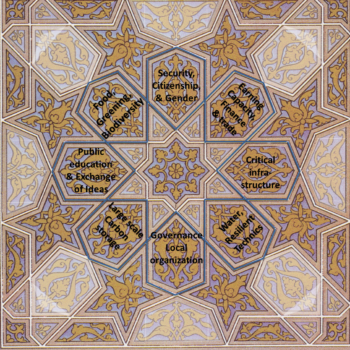An introduction
Invitation
Could I invite you to join us on a journey? A journey which is not easy, and doesn’t have a clear path, or time frame… but focuses on some of the biggest issues of our time: security and climate change.
The people who live in the MENA region (Middle East and North Africa) face big challenges. The intensifying terror attacks in the region and beyond forces the world to respond to groups like Al Qaeda, ISIS and Al Shabaab. The vast number of young people- that lack perspective and long for meaning – fuels terrorism. On the issue of security Europe and the MENA region share big challenges such as refugees and terrorism. Looking beyond the DDD policy of Defence (military response), diplomacy and Development aid to refugees we consider that a civil offensive could become part of successful strategy; a civil offense initiative that targets building more resilience in the societies in the MENA region; Resilience in terms of security, livelihoods and climate change.
Speaking of climate change the climate agreement of Paris is a milestone for civilization and global development. But it is not enough to keep our world safe and our communities secure and liveable. Current trends in desertification, food supply and water stress are drivers for more conflict, more poverty and more victims.
Unusual
Our journey is about taking an unusual, innovative angle to respond to these topics. How about researching a technically speaking feasible perspective, but one which also requires so far uncharted pathways of collaboration?
Imagine:
‘From Waziristan to the Atlas, from Anatolia to the Lak Dera river in Somalia, we see green strings of pearls, consisting of trees and crops. The MENA population itself turned parts of the deserts, grain of sand by grain of sand, into fertile land using a diversity of low-tech and mid-tech methods. They left their dependency of oil and created a new perspective as the granary of the world, creating jobs, food and water supplies. Doing so they addressed large scale problems like terrorism, amounts of refugees, loss of biodiversity and lack of large scale carbon sinks’.
Technology and relationships
To overcome some of the security and climate issues we need to address two topics: technology and collaboration.
- Technically spoken, is it possible to green large parts of MENA as part of the climate change mitigation and adaptation agenda?
- Can we work on building new relationships between governments, societies, companies, SME’s, NGO’s, IO’s and knowledge institutes that can facilitate such a programme?Technically speaking it is possible. There are lots of examples in Asia and Africa of areas greened, revived on the basis of preserving biodiversity and rebuilding water supply systems. Large scale greening to capture and store CO2 is a viable and in the long run unavoidable pathway for the world to stay below the COP 21 target of 1.5 degrees rise of global temperature.The kind of relationships and collaboration that would be needed to bring such a wide-ranging programme to a success is the real challenge. Considering that there is a lot at stake, Stillare proposes to build a coalition and to demonstrate that it can be done. We seek commitments from UN organisations, The World Bank, The European Union, The Dutch Ministries of Foreign Affairs and Economic Affairs, and NGO’s, Foundations, Companies, Knowledge institutes, from Europe and the MENA region to build network based coalitions and finding ways to start projects that realise resilient ways of greening and developing the MENA countries. Stillare is working on mobilising the seed money to start this up.
Technically speaking it is possible. There are lots of examples in Asia and Africa of areas greened. The real challenge is the kind of relationships and collaboration that would be needed to bring such a wide-ranging programme to a success.
An upscaling programme
The programme will consist of a growing number of projects throughout MENA: greening projects, education projects, economic development projects, organization and governance projects, infrastructure and community building projects. Every project has as a common objective to contribute to greening and resilient ways to do so. While working on food and water, jobs and perspective, organization skills and economy these projects implemented in and by communities in the MENA region could make an important step towards societal resilience, security livelihood improvements and climate change mitigation and adaptation.
Starting projects
Stillare is exploring opportunities to start. Our first project could be in a rural community in Tunisia. The community, the owners of the land and the political leaders will be approached shortly. A second project will link our security and climate change aims to livelihood and human rights improvement initiatives with refugee settlements in Turkey.
The working community of our coalition will use easy to understand resilient solutions and methods fitting the local social, cultural and infrastructural situation. The solutions are fitted to local ecological circumstances, involve building nature by nature, and are easy to maintain, repair, repeat and upscale. Micro credits and cooperation as an organizational opportunity will be introduced. Public and individual education, using a diversity of media, will spread the ideas and practices within and amongst communities.
Knowledge exchange
 Stillare is working on a web-based forum. The aim is to facilitate the exchange of and reflection on knowledge that is needed to make each of the projects within the bigger programme a success. The eight fields that have to be addresses are Security, Citizenship & Gender, Earning capacity, Finance & Trade, Critical infrastructure, Water & Resilient technics, Governance & Local organization, Large scale CO2 storage, Public education & Exchange of ideas, Food, Greening & Biodiversity. The multi-disciplinary tool ‘Transition fields for resilience’ that you can see in the picture will help all experts to connect to the bigger picture.
Stillare is working on a web-based forum. The aim is to facilitate the exchange of and reflection on knowledge that is needed to make each of the projects within the bigger programme a success. The eight fields that have to be addresses are Security, Citizenship & Gender, Earning capacity, Finance & Trade, Critical infrastructure, Water & Resilient technics, Governance & Local organization, Large scale CO2 storage, Public education & Exchange of ideas, Food, Greening & Biodiversity. The multi-disciplinary tool ‘Transition fields for resilience’ that you can see in the picture will help all experts to connect to the bigger picture.
Existing programmes
It is important to seriously attempt to involve all the current ecological, agricultural and water related practices. Knowledge partners and pioneers of new ideas to be part of the greening MENA programme. Of course every programme will continue to have its own specific goals and criteria but connecting to the bigger picture of security will be of added value. The perspective of increased security would give each programme extra focus.
The MENA people can experience the improvement of security, economy/livelihood and ecology only, if the local people and the local situation are leading the approach. From Waziristan to the Atlas we have to engage with the people and find fitting ways to make the programme a success. No one size fits all.
Stillare’s preparations:
- We are forming a core team
- We are creating a web-based forum to facilitate knowledge exchange together with the University of Utrecht.
- We are exploring financing opportunities:
a. Seed funding to start a first and second project within the programme and work with the community on development of collaboration and organization and building community security.
b. Funding by collaboration with Corporates, SME’s and banks.
c. Additional support from government policies and programmes to support development of the common goods: security and carbon capture and storage.
